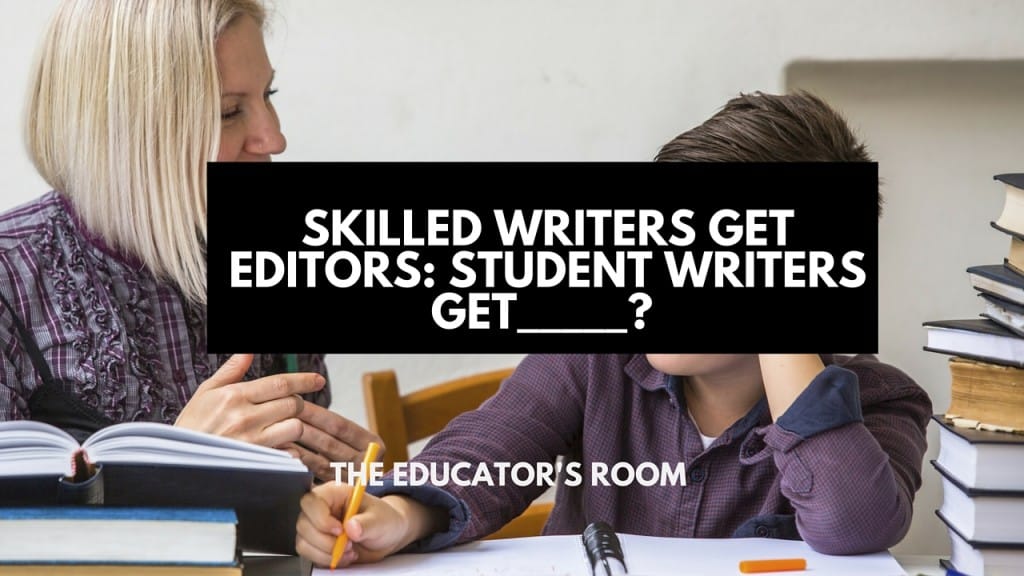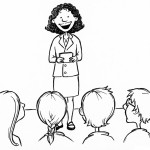On occasion, I hear a statement that captures how much the classroom differs from the real world.
Such was the case at the International Reading Association Conference in Boston (July 9-11, 2016) when literacy consultant Mark Overmeyer noted that in the real world:
“Our most skilled writers have editors…the more skilled the writer, the more editors”
Then he pointed out the obvious,
“So why do we expect our 10-year-olds to write perfectly?”
Editors in the Real World
Overmeyer was speaking at the session to a roomful of educators, attending the session on “Grammar Matters: Promoting Engagement, Strategic Instruction, and Reflection Using Mentor Texts.” His statements highlighted the contrast between the support the best professional writers receive and the support an average student-at any grade level-receives is worth looking into for a moment.
First, in the real world there are different roles editors who specialize in stage of writing. Here is a description of editors, and how these roles are represented (or not) in the writing process in schools today.
- Acquisition Editor: This editor selects books for a publisher, and stays with an author in prepping a book for publication.
Counterpart in education: The teacher may submit a piece for “publication” in a literary magazine, a writing contest, or hang student work on a bulletin board. - Developmental Editor: This is the writing coach, or in some cases, the ghost writer, who supports the writer in moving the writing forward.
Counterpart in education: Could be a teacher - Content Editor: In large publishing houses, there are Content Editors who review all writing.
Counterpart in education: A teacher - Copy Editor: This editor reviews grammar, punctuation, fact-checking, spelling, and formatting. There are Copy Editors for the different forms of publications: newspaper, brochures, books, etc. Some publishers use a line editor as well.
Counterpart in education: teacher, student or student peer - Proofreader: A proofreader reviews writing after an editor.

Counterpart in education: teacher grading the final product.
In the real world, there is an editor for every stage of the writing process. A book will go through an editorial review by a different specialist at LEAST four times before publication. In contrast, a student will receive editorial feedback from one single source….the teacher.
In making his observation, Overmeyer pointed out the fallacy of autonomy that is often seen in schools:
“We [fusion_builder_container hundred_percent=”yes” overflow=”visible”][fusion_builder_row][fusion_builder_column type=”1_1″ background_position=”left top” background_color=”” border_size=”” border_color=”” border_style=”solid” spacing=”yes” background_image=”” background_repeat=”no-repeat” padding=”” margin_top=”0px” margin_bottom=”0px” class=”” id=”” animation_type=”” animation_speed=”0.3″ animation_direction=”left” hide_on_mobile=”no” center_content=”no” min_height=”none”][teachers] purposely do not help,” he noted, “They [students] are on their own!”
He argued that there is an assumption by educators that the students should be able to produce “perfection”.
Writing Towards Improvement
Overmeyer’s point was that student writing should not be used to measure perfection, but used instead to measure a student’s improvement.
Contributing to the drive for perfection Is graded writing. Grading is a diagnosis, an informal or formal assessment of a particular skill set. Because graded writing is diagnostic, students are expected to perform without assistance in order to produce quality writing. More often than not, teachers do not step in to help with writing because they want to know how well a student can perform on his or her own.
Overmeyer’s comment, however, points out this fallacy of autonomy, the false assumption that because a student has been taught particular skills in writing, they should be able to produce correct writing independent of support.
Overmeyer’s reference to the enormous amount of support an adult writer receives in the real world stands in sharp contrast to what students are expected to do. For those adults wishing to enter the field of writing, there are a number of professionals willing -often for a price- to help anyone to become a published writer.
For example, consider the positive support offered by the site, NY Book Editors:
“[Our] editor’s goal is to make your story more engaging. Editors may correct spelling and grammar here and there, but that’s not their role. It’s the job of a copyeditor to fix your grammar, and he steps in at the final stages of the editing process.”
For multiple reasons (time, budget, teacher buy-in, etc.) however, this specialized editorial support is missing in the classroom. Instead of the supportive instruction available to adults, the teacher’s role may shift from developmental editor to copy editor or “corrector-in-chief.”
“Be Human”
The best way to improve student writing is through conferencing, and Overmeyer has detailed how to integrate the different kinds of conferring that can happen in the classroom in his recent book,Let’s Talk.
During the presentation, Overmeyer promoted the role of the teacher as a writing coach, reminding teachers to “be human” when they do provide their feedback to students. He provided an example of a student who chose to wrote about the recent death of a relative.
“That’s not when you correct his paper,” Overmeyer noted. “You need to be human…read the content.”
#ILA16
The International Literacy Association (ILA) Conference in 2016 brought together numbers of like-minded literacy educators and gave them the opportunity to share in order to move the education profession forward. This conference gave also teachers an opportunity to hear one voice -in this case the voice of Mark Overmeyer-pose the challenging question:
“Why do we expect our 10-year-olds to write perfectly?”
We can’t….and we shouldn’t.

[/fusion_builder_column][/fusion_builder_row][/fusion_builder_container]




